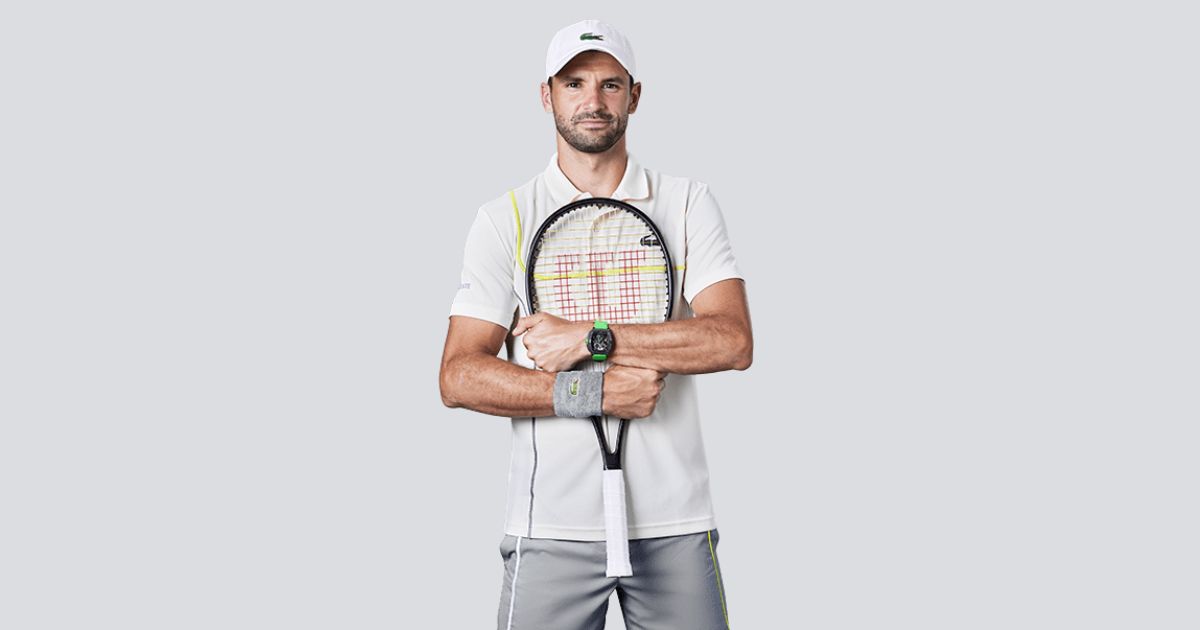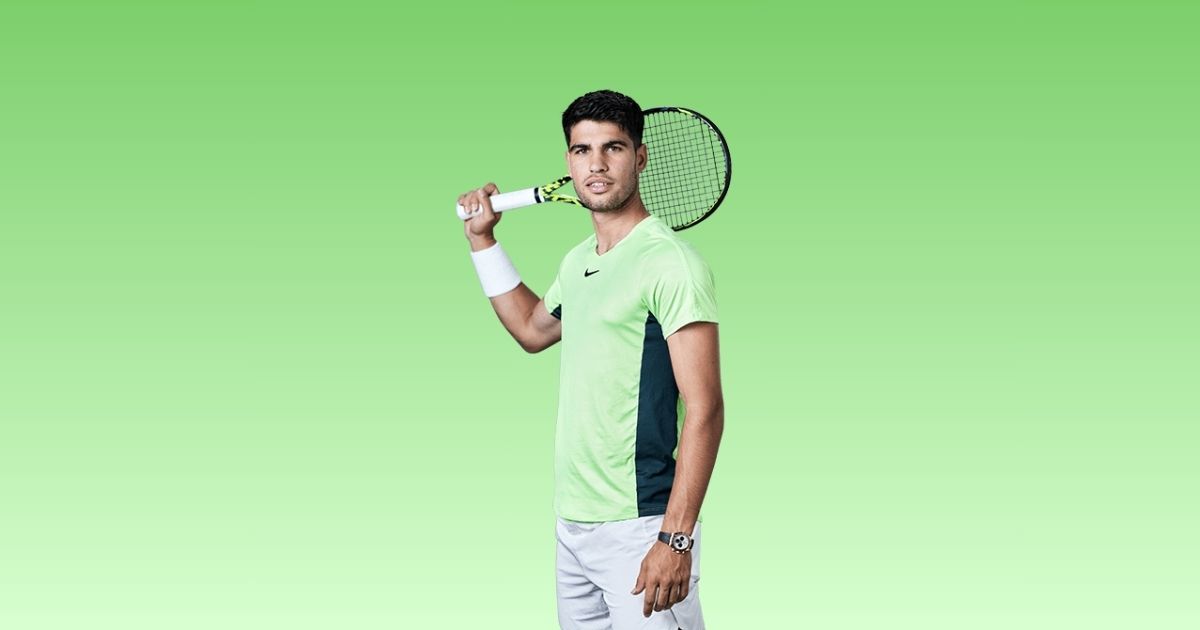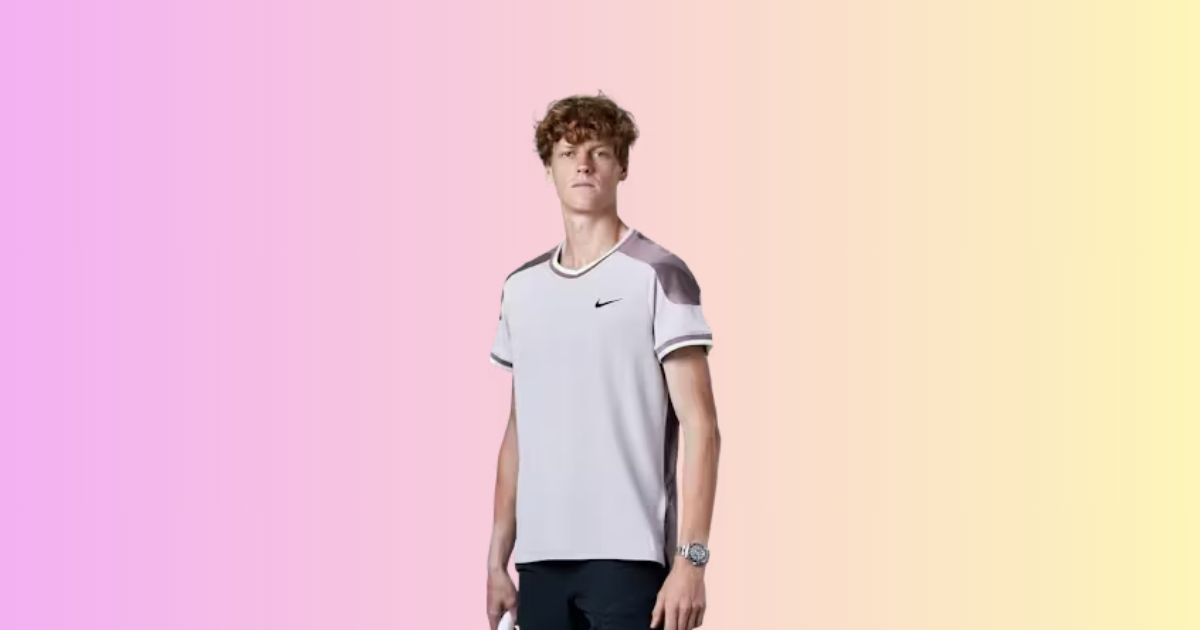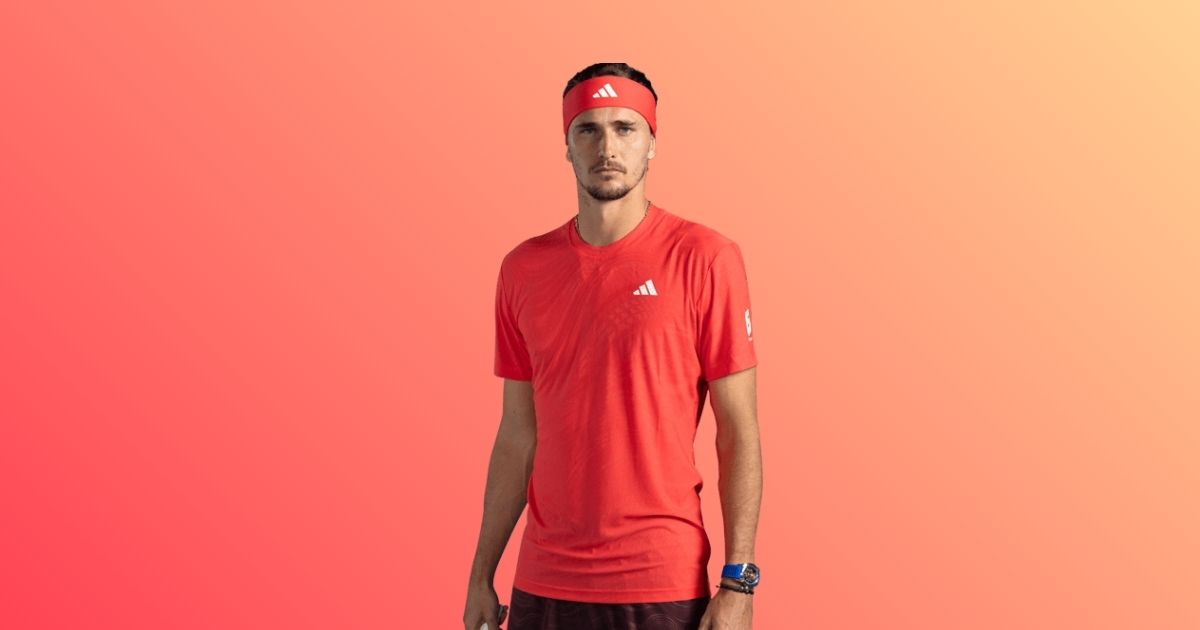Table of Contents
In the overall Grigor Dimitrov biography, the fact that he is moving on to be a top-tier junior player and an ATP Tour successful player is researched and analyzed.
It discusses the key defining happenings that led him to his career as a professional player and finally, breaks it down with an examination of the unconventional ways that Grigor plays tennis making him a formidable competitor of professional tennis.
To the tennis fan the author will demonstrate how Dimitrov has played an all-court game, a wide array of shots, and an intellectual aspect, which has allowed Dimtrov to most often play with the leading players in the world.
Grigor Dimitrov, a Bulgarian tennis prodigy is left in both the memory of the fans and colleagues covered with the name of the sport.
Both the graceful shots and the mental toughness that Grigor was capable of exercising combined with his style of play in his early years got him a glorious nickname Baby Fed.
The life history of Grigor Dimitrov, who started on the courts of Haskovo playing there as a child, and today, at twenty-six, he has to fight against the champion players all over the world is the story of perseverance, of planned process, and of faith which strives to make tennis a perfect game.
This Grigor Dimitrov biography can depict the qualities that made Dimitrov unique in today civilization of men tennis and the ways his style influences the world still with a number of fans and newcomers that want to achieve great things in the game.
The biography does it through exploring the careeralesce, textbook of playing philosophy and the experience of one world class player such as Dimitrov.
Early Life and Background
Personal Information
- Born : May 16, 1991, in Haskovo, Bulgaria
- Height : 6’3″ (191 cm)
- Playing Style : Right-handed, one-handed backhand
- Residence : Monte Carlo, Monaco
Family Foundation and Tennis Beginnings
- Grigor Dimitrov grew up in a sports-oriented family that valued athletic excellence and competitive spirit
- His mother, Maria Dimitrova, was a former volleyball player and sports teacher who instilled discipline and work ethic
- His father, Dimitar Dimitrov, was a tennis coach who introduced him to the sport at age three
- The family made significant sacrifices to support his tennis development, moving to different training locations
- Early exposure to professional coaching methods through his father’s tennis background
Junior Development Path
- Started formal tennis training at age five under his father’s guidance in Haskovo
- Moved to various European tennis academies to develop technical skills and tactical understanding
- Trained extensively in Spain and France, absorbing different coaching philosophies and playing styles
- Showed exceptional natural talent with his one-handed backhand and court coverage abilities
- Won multiple junior tournaments across Europe, establishing himself as a promising prospect
Early Challenges and Growth
- Faced financial constraints typical of players from smaller tennis nations
- Used setbacks as motivation to improve technical and mental aspects of his game
- Developed physical conditioning programs to compete against stronger, more experienced opponents
- Built a support team focused on maximizing his natural shot-making abilities and court sense
Career Overview and Playing Style
Playing Identity and Strengths
All-Court Excellence
- Versatile player comfortable at the baseline, mid-court, and net positions
- Exceptional shot variety allows adaptation to different opponents and match situations
- Natural feel for the game enables creative shot selection and tactical flexibility
- Court positioning intelligence maximizes opportunities for offensive play
Technical Analysis
One-Handed Backhand Mastery
- Signature shot that combines power, precision, and aesthetic beauty
- Generates tremendous topspin and slice variations for different tactical situations
- Down-the-line backhand serves as a primary weapon for opening courts
- Slice backhand provides excellent defensive capabilities and approach shot opportunities
Forehand Technique
- Fluid stroke production with excellent timing and preparation
- Crosscourt and inside-out forehand patterns create offensive opportunities
- Strong net clearance and depth control prevent opponents from attacking
- Ability to redirect pace effectively against power players
Serving Strategy
- Combines power with placement for maximum effectiveness
- First serve focuses on corners and body targeting to set up rally positions
- Second serve emphasizes spin variation and strategic placement
- Clutch serving in pressure moments demonstrates mental toughness
Net Game Excellence
- Natural volleying instincts developed through all-court playing style
- Approaches net behind strong approach shots and serve-and-volley patterns
- Overhead technique provides reliable finishing capability
- Touch and feel around the net create spectacular winners
Surface Adaptability
Hard Courts : Natural surface where his aggressive baseline game and net rushing excel
Clay Courts : Patience and point construction through European training background
Grass Courts : Serve-and-volley skills and slice variations suit the surface perfectly
Major Career Achievements
ATP Tour Success
ATP Masters 1000 Victory
- Cincinnati Masters 2017 represented his biggest career breakthrough
- Defeated multiple Top 10 players during the tournament run
- Victory demonstrated ability to maintain high level throughout an entire week
- Confidence boost led to sustained Top 10 ranking period
ATP Finals Triumph
- Won the 2017 ATP Finals in London, defeating David Goffin in the final
- Became the first debutant to win the year-end championship since 1998
- Victory capped off his best professional season and career-high ranking
Multiple ATP Titles
- Eight ATP singles titles across different surfaces and tournament categories
- Consistent performance in ATP 250 and 500 level events
- Victories against former world number ones and Grand Slam champions
Grand Slam Performance
Semifinal Achievements
- Reached semifinals at Wimbledon 2014 and Australian Open 2017
- Consistent early round victories at all four Grand Slam tournaments
- Multiple fourth round appearances demonstrate sustained Grand Slam level
Notable Grand Slam Victories
- Defeated seeded players across all major tournaments
- Upset victories against higher-ranked opponents through tactical preparation
- Strong grass court results align with his all-court playing style
Break-Through Moments
Career-Defining Victories
First ATP Title Success
- Stockholm Open 2013 victory marked his arrival as a tour-level competitor
- Week-long consistency against quality opponents proved professional readiness
- Mental breakthrough in handling pressure during decisive matches
Masters 1000 Breakthrough
- Cincinnati Masters 2017 run included victories over multiple Top 10 players
- Each match required different tactical approaches and mental adjustments
- Tournament success led directly to career-high ranking and confidence surge
ATP Finals Victory
- Defeated quality field including Goffin, Thiem, and Sock during the week
- Adaptability to different playing styles during pressure matches
- Mental fortitude during biggest matches of his career
Ranking Milestones
Top 10 Achievement
- Entry into elite ranking tier validated years of consistent improvement
- Sustained Top 10 presence required maintaining high performance standards
- Media attention and sponsor opportunities increased with ranking success
Career-High Ranking
- Reached world number 3 in November 2017 following ATP Finals victory
- Achievement represented peak of his professional tennis career
- Ranking reflected accumulated points from consistent tournament results
Personal Life and Interests
Cultural Background and Values
Bulgarian Heritage
- Strong connection to Bulgarian tennis development and national representation
- Cultural pride in representing smaller tennis nation on global stage
- Inspiration for young Bulgarian players pursuing professional tennis
Family Relationships
- Close bonds with parents who sacrificed for his tennis development
- Regular communication with family provides emotional stability during tour
- Support system includes childhood friends and tennis mentors
Interests Beyond Tennis
Fashion and Style
- Known for elegant on-court appearance and fashion sense
- Interest in design and aesthetics extends beyond tennis clothing
- Appreciation for art and culture developed through European training
Music and Arts
- Piano playing provides relaxation and creative outlet
- Classical music appreciation helps with mental preparation
- Artistic interests complement his elegant playing style
Fitness and Wellness
- Advanced physical conditioning programs for tour demands
- Injury prevention through proper movement mechanics
- Recovery protocols enable sustained high-level competition
Public Image and Responsibilities
Media Presence
- Professional handling of press conferences and interview obligations
- Multilingual abilities facilitate international media relationships
- Brand partnerships reflect personal values and authentic connections
Playing Philosophy and Mentality
Core Competitive Beliefs
Match Strategy Principles
- Every point receives complete attention regardless of match situation
- Shot selection balances aggression with intelligent risk assessment
- Tactical flexibility adapts to opponent responses and match conditions
- Pressure situations viewed as opportunities to display skills
Mental Approach Framework
- Preparation reduces anxiety through thorough opponent analysis and tactical planning
- Process focus rather than outcome preoccupation during competition
- Resilience through accepting tennis’s inherently unpredictable nature
- Continuous learning philosophy treats every match as growth opportunity
Training Philosophy
Technical Development
- Refinement of existing strengths rather than complete technique overhauls
- Video analysis identifies patterns and improvement opportunities
- Practice sessions replicate match conditions and pressure situations
- Variety in shot selection prevents opponents from comfortable game planning
Physical Preparation
- Fitness programs emphasize skill enhancement rather than copying other players
- Recovery protocols allow sustained high-level training and competition
- Movement efficiency maximizes court coverage without wasted energy
- Flexibility training supports technical execution under physical stress
Competitive Mindset
Pre-Match Preparation
- Detailed scouting reports inform tactical decisions
- Mental visualization of successful shot execution and point patterns
- Physical warmup routines establish optimal preparation consistency
- Emotional regulation techniques maintain appropriate arousal levels
In-Match Adaptations
- Quick assessment of which tactical approaches work effectively
- Flexibility to adjust game plans based on opponent responses
- Energy management for sustained performance throughout matches
- Between-point routines maintain focus and emotional control
FAQ’s About Grigor Dimitrov Biography
What does it mean by Grigor Dimitrov being referred to as a baby Fed?
His fine playing style, one-handed backhand, and playing in all court are similar to the styles used by Roger Federer and this style earned him this name at the beginning of his career.
What is the most successful thing that Grigor Dimitrov has produced?
To be able to win the 2017 ATP Finals in London, beating a good field of plays and getting his best career ranking marks his major achievement.
How tall is Grigor Dimitrov?
Grigor Dimitrov is 6 feet 3 inches (191 cm) tall and is helpful in reach and leverage.
How high is the ranking of Grigor Dimitrov?
He has been in and out of Top 20 due to his latest outcomes, although during his professional journey he has always been a constant Top 20 player.
In which place Grigor Dimitrov is based?
He is now stationed in Monte Carlo, Monaco unlike several professional tennis players because of the tax benefits and to train there.
What is special about his style of playing?
His one handed back hand, all court capability and shot fluctuation cause hassles to his opponents who prefer to work on a regular basis.
What was the effect on his games and how it impacted his career?
This was additional effort and initiative; raised in Bulgaria, the lack of tennis infrastructure was contrasted to traditional tennis countries.
In which facades does he perform best?
His all-court style fits along with every tangible, whereas his achievement in the grass and his jumping capacities in the net makes him especially efficient through faster surfaces.
What happens under the pressure in case of big matches?
He is calmed down with mental preparation, concentration on tactics and experience in situations with high stakes which make him be composed in crucial situations.
What does he want to do with his career in future?
Further competitive excellent, there could be Grand Slam exaltation, and his ranking as one of the finest players in the world.
Short Summary of Grigor Dimitov Biography
The chart below suffices to prove that overall good performance in tennis is through the combination of innate talent, accumulation of strategies and psychological endurance.
His rise in the world tennis platforms through the Bulgarian courts is a good example of how a youngster can establish himself in the mountains of professional sports with hard work, proper coaching, as well as his tactics.
Tennis players all over the world get motivated in their career through his life. The elegance of settlement that went into shot-making, professionalism, and competition with which his career with him provide valuable lessons concerning optimization of inherited ability through aggressive training and constant practice.
His approach: a blend of style and performance, force and prudence that Dimitrov has used to compete on the peak since his early years of sport gives a good pattern on how the sports of tennis should be able to preserve the sport and allow a place on the court to win by necessitating modern competition principles.

Saurabh is a passionate tennis content writer and lifelong fan of the game. Whether it’s Grand Slam showdowns or under-the-radar rising stars, Saurabh brings the court to life with sharp analysis, breaking news, and deep-dive features. When they aren’t covering matches, you can find them practicing their topspin forehand or debating who is the GOAT over coffee. Do you enjoy tennis? Then you are in the right place.




